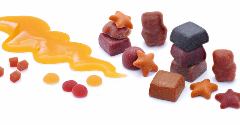News
Nestlé launches fortified dairy drink in Pakistan to tackle micronutrient deficiencies
16 May 2022
Nestlé is targeting micronutrient deficiencies with Bunyard Iron+, a fortified dairy-based drink that provides a source of iron that it says is “three times more absorbed in the body when compared to existing available sources."
The Swiss conglomerate launched this product in Pakistan where it says where one out of two children are deficient in iron.

The proprietary iron source is based on FERRI-PROTM, a technology originally developed by Riddet Institute, Massey University in New Zealand and acquired by Nestlé in January 2019.
Micronutrient deficiencies and hidden hunger
A lack of essential vitamins and minerals is known as hidden hunger. Fortifying staple foods by adding nutrients is a method to tackle the problem of micronutrient deficiencies.
In countries around the world, nutritional deficiencies hinder growth, weaken immune systems and stunt development. According to the Global Alliance for Improved Nutrition (GAIN), some of the most common micronutrient deficiencies result from a lack of iron, zinc, folate, calcium, vitamin A, and vitamin B12.
Swiss food manufacturer Nestlé has targeted several of these missing micronutrients with recent product launches. In addition to the fortified dairy drink launched in Pakistan, the company debuted Nestlé Everyday dairy powder in eastern and southern Africa. The product contains calcium, iron, vitamins and zinc, and Nestlé said that the locally-manufactured product costs about 20% less than alternative options. In India, the corporation also sells Maggi 2-Minute Masala Noodles, which it fortified with 15% of the daily iron requirements.
"Both these new innovations are part of our efforts to address affordable nutrition by providing safe and high-quality products to meet dietary needs and taste preferences around the world," Mayank Trivedi, Nestlé’s head of the dairy strategic business unit said in a statement.
Combating micronutrient deficiencies
Insufficient availability, lack of affordability and a dearth of nutritional knowledge all contribute to inadequate diets in low- and middle-income countries, according to GAIN.
Eighty-one percent of Nestlé’s products are fortified with at least one of the Big Four micronutrients: iron, iodine, vitamin A and zinc. In 2020, the company provided over 196 billion servings of fortified food globally. Nestlé has had a policy on micronutrient fortification since the year 2000.
Related news

Bone broth: From old-fashioned to en vogue
24 Nov 2025
OXO’s entry into bone broth has turned the spotlight on this small but high-performance category – and there is still scope for growth, especially in the area of GLP-1 support.
Read more
Matcha madness: Why green is this year’s hottest colour
19 Nov 2025
Five years ago, it was a struggle to find matcha outside of Japan. Now it seems to be popping up everywhere, from coffee shops to supermarket shelves.
Read more
How younger consumers are redefining ingredient choices and rejecting brand loyalty
18 Nov 2025
Gen Z and millennial consumers’ preferences for transparency, functionality, and purpose are “redefining the very nature of consumption itself”, says SPINS.
Read more
Hybrid formats and flexible positioning to disrupt category norms in 2026
17 Nov 2025
Trend forecasters expect food and drink to move more fluidly across occasions, functions, and formats as consumers seek versatility, novelty, and convenience.
Read more
Empowering innovation in fortification and colouration
13 Nov 2025
Divi’s Nutraceuticals offers a large portfolio of innovative, high-quality ingredients for foods, beverages, and supplements, with bespoke solutions and expert support for product success.
Read more
Predictive maintenance redefines powder mixing reliability
13 Nov 2025
Mill Powder Tech's smart control systems harness real-time data to help the food and biotech sectors achieve zero downtime and smarter output, alongside rigorous GMP standards and ambitious ESG goals.
Read more
From fruit to functional solutions: Meet Paradise Fruits at Fi Europe in Paris
13 Nov 2025
Paradise Fruits Solutions and Paradise Fruits Health will showcase their combined expertise in delivering innovative, fruit-based solutions to the food and beverage industry at the upcoming Fi Europe trade show (2-4 December 2025, Paris).
Read more
Danone highlights digestive health as potential ‘tipping point’ for food industry
13 Nov 2025
Danone is betting on a food industry “tipping point” that will bloat the market for healthy products, particularly those related to gut health.
Read more
Bord Bia presents Irish dairy ingredient suppliers at Fi Europe
6 Nov 2025
Dairygold Co-operative Society, The Carbery Group, and Ornua Co-operative: Meet with sustainable producers of Irish dairy ingredients at Food ingredients Europe 2025, Hall 7.2 Stand M18.
Read more
Ingredient quantities mislabelled on popular protein bars, independent tests show
5 Nov 2025
Some popular protein bars contain more fat, carbs, and/or sugars than claimed on their labels, independent nutrition testing reveals.
Read more